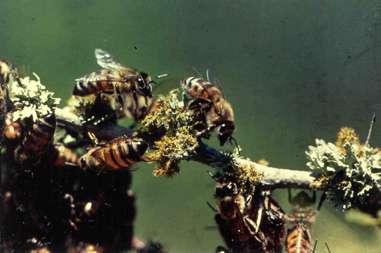South Central Texas residents bewildered by recent bee behavior

Molly Keck, a Texas A&M AgriLife Extension Service entomologist and integrated pest management specialist in Bexar County, has been receiving a number of phone calls from area residents bewildered by recent bee activity.
The atypical bee activity these callers have been reporting may be linked to atypical winter weather conditions, Keck said.
"It's unusual this time of year to be getting calls about bee activity, but the warmer-than-usual temperatures this winter have allowed the bees to be much more active than they would be normally," she said.
Typically bees cope with winter temperatures by forming a cluster in the center of the hive and using the honey reserves they've stored for overwintering, she explained. The motion of the worker bees fluttering their wings and rotating from the outside to the inside of the cluster keeps the bees – and especially the hive's most important resident, the queen – safe and warm.
"But to keep up with this constant use of energy, bees need a food source, honey and pollen, to keep going," she said. "Some studies have found that hives of honeybees can consume up to 30 pounds of stored honey during the winter."
However, she said, during warmer days bees leave the hive to eliminate body waste and search for food. And if the colony did not store enough honey before winter, it will need extra resources.
"Honey bee activity increases on warm or sunny days after rainy or really cold weather," she explained. "When winter temperatures finally warm up, the bees, which have been cooped up trying to stay warm, leave to forage. Additionally, the rain we've had recently has also gotten some wildflowers to grow, so the bees now have an opportunity to pick up some pollen.
"Then again, some bees are just hungry and are looking for sugar, often in the form of the leftovers of sugary drinks tossed into the trash, or they are looking for water from the ground to take back to the nest."
Keck said most callers are concerned about the possibility of bees stinging themselves or their children.
"Honeybees really aren't aggressive unless they are defending their homes, but seeing honey bees in the winter is disconcerting to some people," she said. "However, there's really no need to worry or use any type of control unless you're allergic to bee stings, as they are not aggressive away from their homes unless provoked.
Keck said as bees are at their most aggressive when protecting their home, avoid approaching or disturbing nests or hives.
"If you see bees around your trash can or some other area near your house and are worried about them being too close, you might try putting some sugar water out for them in a location that's farther away," she said.
Provided by Texas A&M University



















